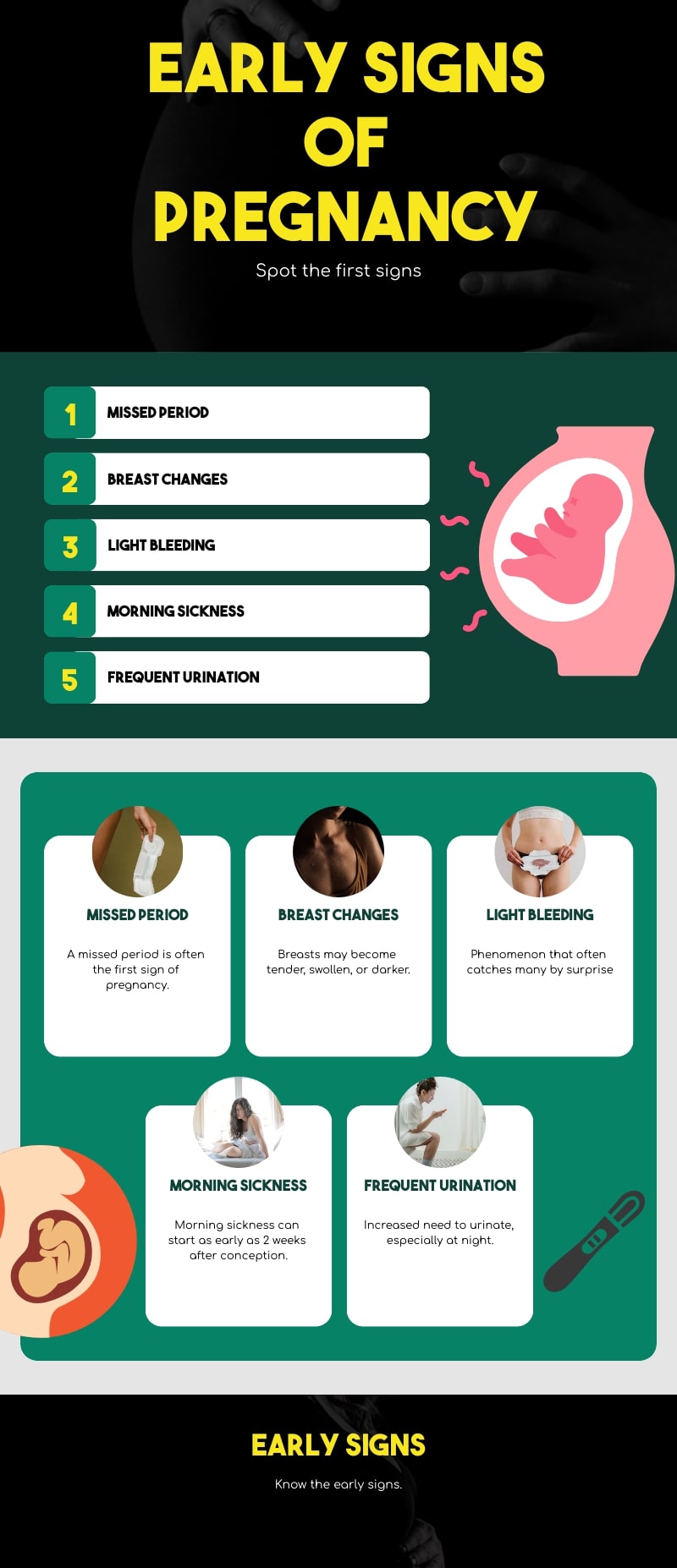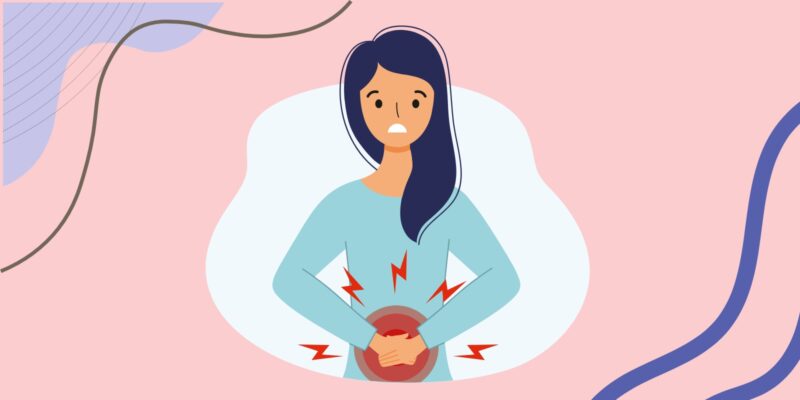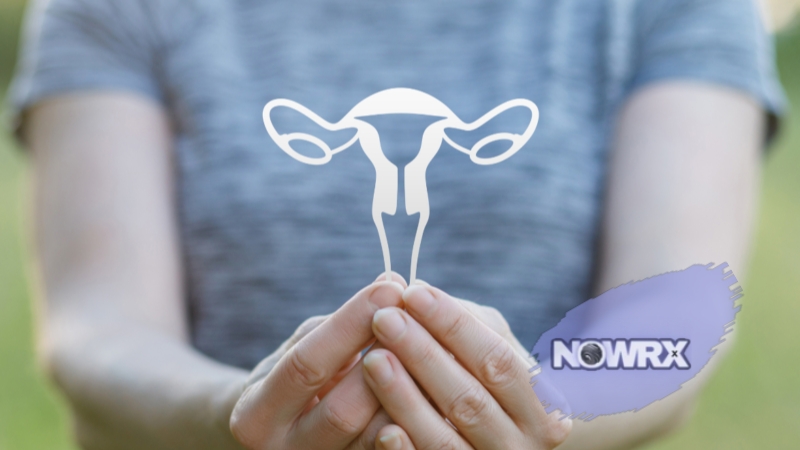Ever felt like your body’s whispering secrets about a tiny new guest? Well, if you’re wondering whether there’s a bun in the oven, catching on to those early whispers can be pretty exciting—maybe even a bit nerve-wracking.
Before the obvious missed period and way before you start picking out onesies, your body starts dropping hints that something’s up.
And getting the lowdown on these early signs isn’t just about satisfying your curiosity—it’s your first step in getting ready for the rollercoaster of motherhood.
Why bother knowing these signs, you ask? Simple: It’s your heads-up to start gearing up for what’s coming.
From making sure you’re chowing down on the right stuff to booking that doctor’s appointment, it’s all about looking out for you and your mini-me on board.

So, ready to play detective with your own body?
1. Missed Period

A missed period is often the first signal that might lead a woman to suspect pregnancy. This early sign is a direct consequence of the intricate hormonal interplay that governs the menstrual cycle. Each month, the body meticulously prepares for the possibility of pregnancy, with the uterine lining thickening in anticipation of a fertilized egg’s implantation.
When conception occurs, the usual shedding process that manifests as a menstrual period is halted. This cessation is the body’s way of creating a nurturing environment for the embryo, leading to the absence of the menstrual flow, commonly referred to as a missed period.
It’s crucial, however, to approach the absence of a period with a nuanced understanding. The menstrual cycle can be influenced by a plethora of factors beyond pregnancy. Stress, for instance, can significantly impact hormonal levels, leading to delayed or missed periods.
Hormonal imbalances, often stemming from conditions such as polycystic ovary syndrome (PCOS) or thyroid disorders, can also disrupt the regularity of the menstrual cycle. Furthermore, lifestyle changes, including significant weight fluctuations or intense exercise routines, can affect menstrual regularity.
2. Spotting and Light Bleeding
Spotting or light bleeding in the early stages of pregnancy is a phenomenon that often catches many by surprise. This occurrence, widely recognized as implantation bleeding, marks a significant event in pregnancy—the successful attachment of the fertilized egg to the uterine lining.
This critical process initiates the development of the placenta, essential for the embryo’s nourishment throughout pregnancy. Implantation bleeding is the body’s natural response to the slight disruption caused by the egg embedding itself into the uterine wall, leading to minor bleeding.
| Feature | Implantation Bleeding | Menstrual Bleeding |
|---|---|---|
| Duration | A few hours to a few days | 4 to 7 days, sometimes longer |
| Flow | Light spotting or very light bleeding | Moderate to heavy flow, requiring sanitary protection |
| Color | Pink, brown, or light red | Bright red to dark red |
| Timing | Around 10 to 14 days after conception, close to when a period is due | Regularly, as part of the menstrual cycle |
| Accompanying Symptoms | May include mild cramping or discomfort | Often accompanied by more pronounced menstrual cramps, bloating, and mood swings |
3. Breast Changes
Breast changes are among the earliest indicators of pregnancy, often serving as a preliminary sign even before a missed period. The body undergoes profound hormonal adjustments during the initial stages of pregnancy, with estrogen and progesterone levels rising to facilitate the development of the fetus.
These hormonal shifts have a direct impact on the breasts, preparing them for the vital role of nourishment post-birth. Women may experience a spectrum of sensations in their breasts, ranging from mild tenderness to pronounced sensitivity and discomfort.
Unlike the more predictable breast discomfort that precedes menstruation, the changes during early pregnancy are typically more acute and persistent. The breasts may feel heavier and fuller, a sensation that can extend beyond the usual premenstrual timeframe and persist as the body adapts to its pregnant state.
The physical appearance of the breasts can also change noticeably. The areolas, the dark circles around the nipples, often darken and enlarge—a change thought to be linked to the body’s preparation for breastfeeding. This darkening is believed to make the nipples more visible to the baby, facilitating the breastfeeding process.
The veins on the surface of the breasts may become more pronounced, reflecting the increased blood flow necessary to support both the mother and the developing fetus. This enhanced vascularization is a natural part of the body’s adaptation to pregnancy, ensuring that the breasts are well-prepared for their nurturing function.
4. Morning Sickness

Morning sickness is one of the most commonly recognized signs of early pregnancy, affecting a significant number of women with varying intensity and duration. Despite its misleading name, morning sickness does not confine itself to the morning hours; women can experience nausea and vomiting at any time of the day or night.
| Period After Conception | Common Experiences |
|---|---|
| 1-2 Weeks | Rarely any symptoms; too early for morning sickness. |
| 3-4 Weeks | Some women may start to experience mild nausea or aversions. |
| 5-6 Weeks | Morning sickness begins for many women, characterized by nausea and sometimes vomiting. |
| 7-12 Weeks | Symptoms may peak during this period, with varying degrees of nausea throughout the day. |
| 13-16 Weeks | For many women, morning sickness starts to diminish or completely subsides as the second trimester begins. |
| After 16 Weeks | A small percentage of women may continue to experience morning sickness beyond the first trimester. |
The primary culprit behind morning sickness is believed to be the rapid increase in hormone levels, especially human chorionic gonadotropin (hCG), which is produced shortly after the embryo attaches to the uterine lining.
This hormone plays a crucial role in maintaining the pregnancy but can also trigger the nausea and vomiting associated with morning sickness. The experience of morning sickness varies greatly from one woman to another, both in terms of when it starts and how severe it becomes.
For many, symptoms begin around the sixth week of pregnancy, but it’s not uncommon for women to notice them earlier or later. Alongside nausea, women may develop strong aversions to certain foods or smells that previously had no effect on them, while others might find themselves craving specific items.
5. Fatigue

The root cause of fatigue is the body’s increased production of progesterone, a hormone essential for the healthy development of the fetus. Progesterone not only supports the uterine environment necessary for the embryo’s growth but also exerts a calming, almost sedative effect on the body, leading to heightened feelings of sleepiness and fatigue.
The demands of supporting a developing fetus are immense. From the moment of conception, the body begins to undergo a series of complex changes designed to support the pregnancy. These changes include increased blood volume and metabolic rate, which can strain the body’s resources and contribute to feelings of fatigue.
The energy required to build the placenta, the organ that nourishes the fetus throughout the pregnancy, further depletes the body’s reserves, compounding the sense of exhaustion. Fatigue in early pregnancy is a clear message from the body, urging the expectant mother to slow down and prioritize rest and self-care.
It’s a reminder that the body is undertaking one of the most energy-intensive processes it will ever experience, and acknowledging this need for extra rest is crucial for both the mother’s and the developing baby’s health. Fortunately, these can be battled with antibiotics.
6. Frequent Urination
Frequent urination is a common early sign of pregnancy that many women notice as their bodies begin to undergo significant changes. This increase in the need to urinate stems from a combination of physiological adjustments designed to accommodate and nurture the developing fetus.
One of the primary reasons for this symptom is the increase in blood volume. Early in pregnancy, the body starts to produce more blood to ensure that the fetus receives the necessary nutrients and oxygen for growth. This increase in blood volume means the kidneys have more fluid to filter, resulting in a higher volume of urine being produced.
As the pregnancy progresses, the growing uterus begins to place additional pressure on the bladder. This pressure reduces the bladder’s capacity to hold urine, leading to a more frequent need to urinate.
This symptom is particularly noticeable during the second and third trimesters when the size of the uterus increases significantly. Many women start experiencing it as early as the sixth week of pregnancy.
Points to consider regarding frequent urination during pregnancy include:
- Early Onset: The need for more frequent bathroom visits can begin as early as the sixth week of pregnancy and is one of the first signs many women notice.
- Increased Blood Volume: The body’s production of additional blood to support the fetus is a primary cause of increased urination.
- Pressure on the Bladder: As the uterus grows, it exerts more pressure on the bladder, decreasing its capacity and leading to more frequent urination.
- Hydration is Key: Despite the increased frequency of urination, it’s important for pregnant women to maintain good hydration levels.
- Nighttime Urination: Many women find that they need to urinate more frequently during the night, which can disrupt sleep.
7. Food Aversions and Cravings

Early in pregnancy, many women report a sudden shift in their dietary preferences, with certain foods becoming particularly appealing, while others, previously enjoyed, may now provoke a strong sense of disgust.
These changes in taste and smell sensitivities are not only common but also serve an important evolutionary function, believed to protect the developing fetus from potential toxins and ensure the mother consumes the nutrients necessary for healthy fetal growth.
Food Aversions
Food aversions during pregnancy can be so strong that even the thought or smell of certain foods can trigger nausea or vomiting.
Hormonal changes could affect the food you enjoy, particularly early in your pregnancy. For example, human gonadotropin (also known as hCG) is a hormone produced during pregnancy. It can cause feelings of nausea, appetite changes, and food aversion.
Common aversions include foods with strong flavors, such as coffee, alcohol, fried foods, and certain meats or fish. The aversion to these items may be the body’s way of steering clear of substances that could pose a risk to the fetus, even if the risk is minimal in a modern context.
Food Cravings
Cravings for specific foods during pregnancy can be equally intense. Sometimes you might crave common foods such as chocolate cake or apples.
Sometimes you might want to eat unusual food combinations or foods that you normally don’t like. Common food cravings include ice cream, chocolate, other sweet foods, fish, dairy products, and fruit.
While the exact cause of these cravings is not fully understood, they may be related to the body’s attempt to obtain certain nutrients lacking in the diet or to satisfy increased caloric needs during pregnancy.
For example, cravings for citrus fruits or other vitamin C-rich foods could be the body’s way of ensuring sufficient vitamin intake for both the mother and the developing baby.
8. Mood Swings
The early stages of pregnancy are a time of profound change, not just physically but emotionally as well. The surge in hormones such as estrogen and progesterone, essential for maintaining pregnancy, can have a significant impact on a woman’s emotional state.
These hormonal fluctuations can lead to mood swings that range from feelings of elation to bouts of unexplained sadness or irritability. It’s not uncommon for pregnant women to experience heightened sensitivity to their environment or to find themselves reacting more emotionally to situations that would not have affected them as deeply before pregnancy.
These mood swings are a natural and expected part of pregnancy, reflecting the body’s adjustment to its new state and the psychological process of preparing for motherhood.
The realization of becoming a parent, along with the physical changes happening in the body, can evoke a wide range of emotions, from anxiety and uncertainty to excitement and joy.
| Emotional State | Description | Management Suggestions |
|---|---|---|
| Increased Sensitivity | Heightened emotional response to everyday situations. | Practice mindfulness or meditation to stay centered. Seek supportive conversations with friends or family. |
| Irritability | Quick to frustration or annoyance over minor issues. | Ensure adequate rest and relaxation. Communicate feelings openly with loved ones. |
| Tearfulness | Episodes of crying or feeling overwhelmed without a clear cause. | Allow yourself to express emotions without judgment. Consider journaling to process feelings. |
| Anxiety | Concerns about pregnancy, health, or the future. | Talk to a healthcare provider for reassurance. Connect with a support group of expectant mothers. |
| Elation | Periods of intense happiness and optimism. | Channel positive energy into creative outlets or pregnancy planning. |
| Fatigue-Induced Moodiness | Tiredness exacerbates emotional sensitivity. | Prioritize sleep and rest. Adjust daily activities to conserve energy. |
9. Bloating and Abdominal Discomfort

Bloating and abdominal discomfort are frequent complaints in the early stages of pregnancy, often confusing as they closely resemble the symptoms experienced before a menstrual period. The root cause of these symptoms in pregnancy is the significant hormonal shifts that occur as the body prepares to support the developing fetus.
Progesterone, in particular, increases dramatically during early pregnancy. While this hormone plays a crucial role in maintaining pregnancy by relaxing the muscles of the uterus, it also relaxes other muscles in the body, including those in the gastrointestinal tract.
This relaxation slows down digestion, leading to a buildup of gas, which can cause bloating, discomfort, and constipation. The sensation of bloating may be accompanied by a feeling of fullness or tightness in the abdomen, often exacerbated after eating.
Constipation, another side effect of slowed digestion, can further contribute to abdominal discomfort, making it a persistent issue for many pregnant women during their first trimester and sometimes beyond.
10. Heightened Sense of Smell
A heightened sense of smell, or hyperosmia, is a common and sometimes perplexing symptom reported by many women in the early stages of pregnancy. This increased olfactory sensitivity can turn everyday scents into overpowering and often overwhelming experiences.
For some, previously pleasant or neutral odors become intolerable, leading to nausea or triggering food aversions, which are also common in early pregnancy. Conversely, some scents may become more appealing, influencing cravings for specific foods.
The exact biological mechanisms behind this surge in olfactory sensitivity remain a topic of scientific inquiry, but prevailing theories suggest a strong link to the hormonal fluctuations characteristic of early pregnancy.
Estrogen, in particular, is known to play a significant role in regulating the sense of smell, and its levels increase significantly during pregnancy.
This hormonal surge is believed to enhance the sensitivity of the olfactory system, making pregnant women more attuned to the smells around them.
FAQs
Now, don’t forget, these early hints your body drops. They’re all over the map. One friend might be all about those late-night fridge raids from day one, while another might not feel any different till later on.
And sure, paying attention to what’s going on is smart, but at the end of the day, peeing on that stick and having a chat with your doc is the only way to hit the ‘confirm’ button on this whole ‘Am I pregnant?’ question.
So, yeah, keep an eye out, listen to your body, and when in doubt, check it out. After all, it’s the start of one heck of an adventure, and you want to make sure you’re both strapped in and ready to roll.”
This more laid-back and conversational tone aims to make the information feel more personal as if it’s advice coming from a friend.
Sources
1.https://www.vinmec.com/en/news/health-news/obstetrics-gynecology-and-assisted-reproductive-technologies-art/does-holding-urine-during-pregnancy-affect-the-fetus/
2. https://link.springer.com/chapter/10.1007/978-1-4684-5421-5_5
3. https://www.pregnancybirthbaby.org.au/hcg-levels
4. https://myhealth.alberta.ca/Health/Pages/conditions.aspx?hwid=aa87816&lang=en-ca
5. https://www.ncbi.nlm.nih.gov/books/NBK551634/#:~:text=The%20placenta%20is%20formed%20gradually,diameter%20and%203%20cm%20thick.
6. https://www.hopkinsmedicine.org/health/conditions-and-diseases/polycystic-ovary-syndrome-pcos#:~:text=Polycystic%20ovary%20syndrome%20(PCOS)%20is,that%20form%20in%20the%20ovaries.
7. https://www.mayoclinic.org/diseases-conditions/amenorrhea/symptoms-causes/syc-20369299#:~:text=Amenorrhea%20(uh%2Dmen%2Do,one%20or%20more%20menstrual%20periods.
8. https://intermountainhealthcare.org/blogs/how-hydration-during-pregnancy-can-benefit-you-and-your-baby
9. https://www.parents.com/pregnancy/my-body/nutrition/food-aversions-in-pregnancy-why-are-your-favorite-foods-suddenly-gross/#:~:text=Food%20aversions%20during%20pregnancy%20are,a%20heightened%20sense%20of%20smell.
10. https://www.sciencedirect.com/topics/medicine-and-dentistry/mood-swing
11. https://www.babycenter.com/pregnancy/health-and-safety/pregnancy-hormones_40010128
12. https://www.nhs.uk/pregnancy/related-conditions/common-symptoms/stomach-pain/
13. https://www.sciencedaily.com/releases/2022/01/220119121358.htm
I’m Alastair Watt, a pharmacist with decades of experience in the industry. Recently, I’ve decided to pursue my writing passion, and it resulted in my content at nowrx.com and collaboration with many other websites.
Related Posts:
- Early Symptoms of Uterine Fibroids - Be Aware of…
- Top 6 Signs To Look For If You Think That You Are…
- Taking Vitamins While Fasting - What You Need to Know
- Losartan Side Effects, Uses – What You Need to Know
- How To Refill A Prescription – What You Need To Know
- Top 7 Causes Of Urinary Tract Infection UTI - What…








